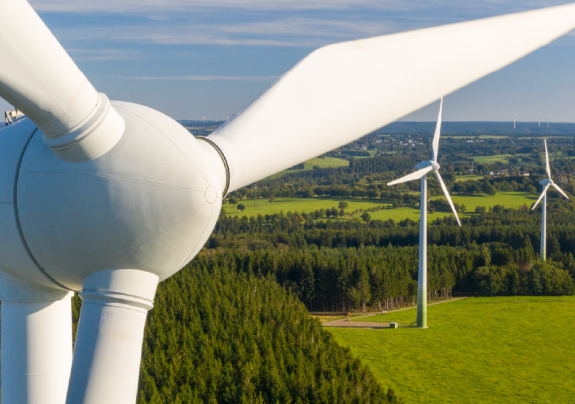Playing our part in tackling climate change is aligned with our purpose to deliver caring banking which is why we are committed to ensuring that we understand the risks and opportunities that climate change presents to our business and key stakeholders.
We recognise that the growth and sustainability of our business depend on the resilience of our operations, our supply chains, and the communities where our customers and colleagues live and work. As such, we aim to minimise our environmental impacts and work with others to take action on the issue of climate change. Our commitment to do this is underpinned by our ambition to achieve net zero carbon dioxide emissions from 2021 levels by 2040. In doing so, we acknowledge that it is not possible for anyone to get to net zero alone. Interventions by Government in terms of policy and to support the development of new technologies and initiatives are vital to creating an economy and enabling everyone to transition to net zero in a fair and just way. Without good progress on these issues, achieving our climate ambitions will be challenging. Companies from all sectors and all their stakeholders must work in concert in order to make this transition a reality.
Our climate strategy
Our strategy is to ensure that climate-related risks are integrated into our business strategy and decision making in areas such as operational resilience, customer service, and supply chain management, and, where appropriate, capital allocation. In order to deliver on our strategy, our approach is to identify climate-related risk factors and opportunities which have potential to impact our business activities over short-term, medium-term and long-term time horizons. In doing this, we consider the climate-related risks and opportunities in the context of the products and services we provide to our customers, as well as those that relate to our operation and infrastructure.
Understanding and Managing Climate Risks and Opportunities
Climate change considerations are integrated within the Group’s Risk Management Framework which enables us to identify, analyse and report material climate change-related risks and opportunities and their financial impact on the Group. Climate Risk is a level 1 risk which sits within Regulatory principal risk (P2). This is because the Group’s long-term success is dependent on the sustainability of its operations and business models, and the resilience of its supply chain.
We have published climate-related financial disclosures in our Annual Report and Financial Statements 2024 for the year ended 31 December 2024 that we believes are consistent with the four pillars and 11 recommended disclosures of the Task Force on Climate-related Financial Disclosures (TCFD) (as defined in the FCA’s Listing Rule 6.6.6(8), the Climate related Financial Disclosure (CFD) Regulations 2022 and the UK Companies Act (that is, sections 414CB(2A)(a to h)).
Our science-based targets
In January 2024 our carbon reduction targets were validated and approved by the Science Based Target Initiative (SBTi). These targets meet the following three criteria: They have a clearly-defined emissions reduction pathway; they have a defined baseline amount and year, as well as target goal date; they are set in line with the latest climate science necessary to meet the goals of the Paris agreement (i.e., to limit global warming to well-below 2°C above pre-industrial levels and pursuing efforts to limit warming to 1.5°C). These targets are to:
- Reduce our scope 1 and 2 GHG emissions by 39.9% by 2028. This target is an absolute target which has been set using the SBTi’s target setting tool. The scope 1 and 2 science-based targets is set to be achieved by 2028 in a linear reduction by 5.2% per year. The baseline year for this target is 2021.
- Engage with our top 78% of suppliers by spend (i.e., 18 suppliers) which account for 72% of scope 3, category 1 GHG emissions to reduce their own carbon emissions by 2027.
We are committed to publicly reporting our progress.
Managing and Reporting our Environmental Performance
A key tool that helps us to manage and reduce our impact on the environment is our environmental management system (EMS), which we have had in place for 20 years. Our EMS helps us to identify, assess and reduce key environmental risks and impacts; set and deliver against environmental targets; and ensure our legal compliance. This EMS is independently audited each year against the requirements of the international management standard ISO 14001:2015. Following the third-party audits carried out in 2024, all our main premises in Bradford, London, Chatham in Kent and Petersfield in Hampshire continued to be certified to ISO 14001:2015.
Details of our scope 1 and 2 GHG emissions in tonnes of CO2e, along with a relevant intensity ratio (i.e., kilogrammes of CO2e per customer) and information on underlying energy use for 2023, can be found in our Annual Report and Financial Statements 2023. We also measure and report on a range of other environmental metrics, including those that relate to the waste we generate and recycle, the water we use and paper used across our business. This information is set out in our ESG data table.
Reducing our carbon footprint
Set out below are key reductions in our carbon footprint which occurred throughout 2024, when compared to the same period in 2023.
reduction in our scope 1 and 2 (and associated scope 3) GHG emissions
reduction in the energy (electricity and gas) used by the business
reduction in the GHG emissions produced by the processing of waste




